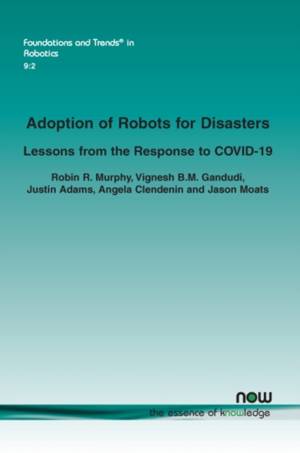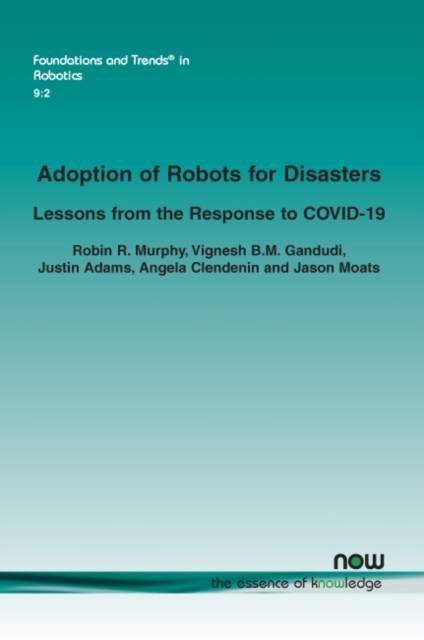
- Afhalen na 1 uur in een winkel met voorraad
- Gratis thuislevering in België vanaf € 30
- Ruim aanbod met 7 miljoen producten
- Afhalen na 1 uur in een winkel met voorraad
- Gratis thuislevering in België vanaf € 30
- Ruim aanbod met 7 miljoen producten
Zoeken
Adoption of Robots for Disasters
Lessons from the Response to Covid-19
Robin R Murphy, Vignesh B M Gandudi, Justin Adams, Angela Clendenin, Jason Moats
€ 65,95
+ 131 punten
Omschrijving
This publication describes how robot innovations are adopted during a disaster using the COVID-19 response, both as a natural experiment and a case study. While the reports do not provide full details to ascertain gaps in specific algorithms or specific subsystems, the size and the pervasiveness of the data permits examination of three questions, namely: how the need for a robot arises during a disaster; whether those needs are met with existing technically mature robots, adapting existing robots, or innovating new robots; and what are the major barriers to inserting robots into use during a disaster. The analysis utilizes a novel formal framework consisting of a sociotechnical work domain analysis, an extended demand analysis, and a rating of the technical maturity of each instance using the NASA Technical Readiness Assessment (TRA) ranking. Also covered are related works in modeling the adoption of robots and prior summative of the use of robots for the coronavirus pandemic, as well as a novel framework for analysis is discussed in detail. An analysis is also made of all Heritage systems, Engineering systems, and New systems. The paper concludes with findings for disaster robotics, then uses the model of adoption to make four recommendations for roboticists interested in developing and deploying technology for a disaster. This publication provides an in-depth overview and practical examples of how robots can be deployed during a disaster. As such it should prove useful for roboticists, researchers in various fields related to robotics as well as industry professionals who are responsible for saving lives and mitigating societal impacts in times of disaster.
Specificaties
Betrokkenen
- Auteur(s):
- Uitgeverij:
Inhoud
- Aantal bladzijden:
- 84
- Taal:
- Engels
- Reeks:
Eigenschappen
- Productcode (EAN):
- 9781680838626
- Verschijningsdatum:
- 31/08/2021
- Uitvoering:
- Paperback
- Formaat:
- Trade paperback (VS)
- Afmetingen:
- 156 mm x 234 mm
- Gewicht:
- 131 g

Alleen bij Standaard Boekhandel
+ 131 punten op je klantenkaart van Standaard Boekhandel
Beoordelingen
We publiceren alleen reviews die voldoen aan de voorwaarden voor reviews. Bekijk onze voorwaarden voor reviews.











